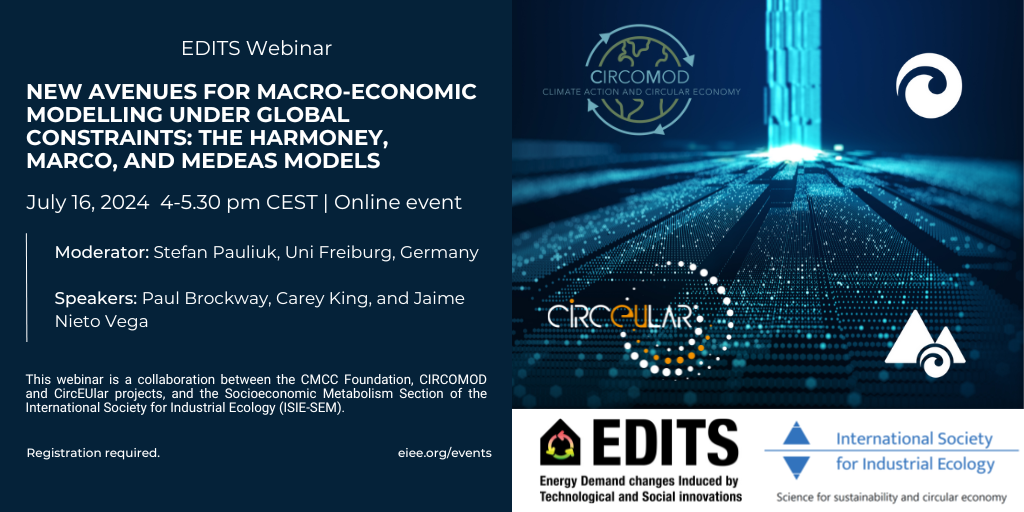The next session of the Socioeconomic Metabolism section's Perpetual Online Conference is up!
We want to invite you to attend an upcoming online session of the ISEM SEM Perpetual Online Conference on "New avenues for macro-economic modelling under global constraints: The HARMONEY, MARCO, and MEDEAS models".
Date & time: Tuesday, 16 July 2024, 14:00-15:30 UTC
(10:00-11:30 New York, 16:00-17:30 Berlin, 22:00-23:30 Beijing)
Location: Online (Zoom).
Speakers:
Dr. Paul Brockway - Faculty of Environment - University of Leeds, UK. Dr Paul Brockway is an Associate Professor in Energy and Economics at the Sustainability Research Institute at the University of Leeds, UK. He has a 5 year research fellowship on the topic ‘Applying thermodynamic laws to the energy-GDP decoupling problem’, where he applies an Exergy Economics approach to study thermodynamic energy conversion within energy-economy modelling frameworks.
Dr Carey King - Energy Institute, The University of Texas at Austin. Dr. Carey W King performs interdisciplinary research related to how energy systems interact within the economy and environment as well as how our policy and social systems can make decisions and tradeoffs among these often competing factors. Carey is Research Scientist at The University of Texas at Austin and Assistant Director at the Energy Institute of the University of Texas at Austin.
Dr Jaime Nieto Vega, University of Valladolid, Spain and the University of Leeds, UK. Since 2016, Dr Nieto has been working as a researcher at the University of Valladolid; and in 2018, he combined this work with a long and fruitful stay at the University of Leeds. He currently works part-time at both centers, contributing his efforts on researching the interactions between the economy and the environment, specifically in relation to energy resources.
Moderator: Stefan Pauliuk, Uni Freiburg, Germany
This online seminar is a joint event by EDITS, CMCC, the CIRCOMOD and CircEUlar EU Horizon projects, as well as the Socioeconomic Metabolism Section and the Sustainable Circular Economy Section of the International Society for Industrial Ecology (ISIE).
Event page and registration:
Here's the event page: https://www.eiee.org/event/edits-webinar-4/
Zoom registration link: https://cmcc-it.zoom.us/webinar/register/WN_DUVhETVHRPWh8fGeQ9DpVA#/registration
Abstract:
Common energy-economy models feature only limited energy-economy integration and thermodynamic consistency. Typically, they only assign a small role for energy in economic growth and fail to explicitly include the useful stage of energy flows or ignore thermodynamic efficiencies in primary–final–useful energy transformations. As a consequence, the economy-wide impacts of the energy system transformation are potentially underestimated, and the physical feasibility of different transformation remains unassessed. Furthermore, material cycles and stocks of buildings, infrastructure and machinery, as well as explicit indicators of service provisioning for housing, nutrition, mobility, etc are often also not well represented (Wiedenhofer et al. 2024). This limits our ability to assess the potentials of materials- and energy-oriented supply- and demand-side strategies aligned with a 1.5-2°C global warming limit.
In response, novel macro-econometric models are being developed for coupling the transformations of the energy system (efficiency, energy services, rebound), the industrial system (materials, products) and the macro-economic system (employment, GDP, debt). In this seminar, three leading model frameworks are presented, which address these challenges:
HARMONEY, presented by Carey King: A long-term dynamic growth model that endogenously links biophysical and economic variables in a stock-flow consistent manner.
MARCO, presented by Paul Brockway: A post-Keynesian framework, explicitly including thermodynamic energy efficiency and flows of useful energy, with stochastic equations and econometrically estimated parameters.
MEDEAS, presented by Jamie Nieto: An open source modelling framework to represent biophysical constraints to energy availability, integration of detailed sectoral economic structure (input–output analysis) within a system dynamics approach, and a rich set of socioeconomic and environmental impact indicators.
After an introduction to the model frameworks, there will be a common discussion about the underlying assumptions, data needs, further development, and future applications.

